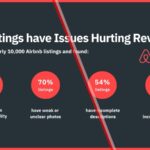European Commission President Ursula von der Leyen briefly mentioned short-term rentals (STRs) in her 2025 State of the Union address, signalling that a new EU-level initiative may be on the horizon. While her Strasbourg speech was dominated by defence, Ukraine, and Europe’s strategic independence, the reference to STRs shows that Brussels intends to move beyond data collection toward direct regulation.
Housing Crisis: The Bigger Picture
In her speech to the European Parliament, von der Leyen described Europe’s housing shortage as not just an economic problem but a “social crisis” that undermines cohesion and competitiveness. She cited rising housing costs (+20% since 2015), falling building permits (–20% over five years), and the pressures on workers, students, and young families.
Her proposed response included:
- A forthcoming European Affordable Housing Plan.
- A revision of state aid rules to give governments more flexibility to fund affordable housing.
- And, in a single line, a commitment:
“We will also propose a legal initiative on short-term rentals to tackle the remaining issues.”
What She Actually Said About STRs
This was the only reference to STRs in the entire State of the Union. There were no definitions, no host categories, and no policy details. STRs were mentioned as one element of a wider housing agenda, itself a secondary theme compared to the speech’s focus on war and security.
For industry observers, the importance lies not in detail — there was none — but in the fact that STRs made it into a flagship political speech at all.
Why STRs Were Named
Short-term rentals remain highly visible in political debates around affordability. Cities such as Lisbon, Barcelona, and Athens argue that STR growth reduces long-term rental supply, while platforms like Airbnb counter that construction shortages and vacant housing stock are the real drivers of the crisis.
By naming STRs in Strasbourg, von der Leyen gave voters a signal: the Commission intends to take the issue further at EU level.
Background: What’s Already in Motion
This would not be the EU’s first step on STRs. A 2022 transparency regulation already laid the groundwork:
- Nov 2022: The Commission proposed a regulation requiring platforms like Airbnb, Vrbo, and Booking.com to share host and booking data with local authorities.
- 2023–2024: Parliament and Council reviewed and negotiated the proposal.
- By 2025: The regulation is close to final adoption, with provisions on systematic registration and data-sharing expected to apply gradually from late 2025 into 2026.
This law focuses on transparency and enforcement, giving cities better tools to monitor activity. If von der Leyen’s 2025 pledge is carried forward, it would represent a second phase: moving from transparency to more direct regulation tied to affordability.
Parliament’s Position: The S&D Study
Separately, a May 2025 study commissioned by the Socialists & Democrats (S&D) group in Parliament proposed a comprehensive framework for STRs, including:
- A clear legal distinction between non-professional hosts (occasional, single-property) and professional hosts (multi-property, year-round).
- Allowing cities to apply stronger measures (night caps, registration schemes, zoning) particularly to professional operators.
- Minimum safety and anti-discrimination standards for listings.
This study is not Commission policy, but it shows what one major political group will push for once the Commission tables a legislative proposal.
What Happens Next
- Current status: Von der Leyen’s line is a political signal, not yet a legal proposal.
- Process: The Commission must still draft legislation; Parliament and Council will then debate and amend it.
- Timeline: If the Commission moves ahead, detailed proposals are likely in 2025–2026, with implementation of new rules from 2026–2027 onwards. This fits normal EU legislative timelines and the phasing of existing transparency rules.
Why Property Managers Should Pay Attention
For now, nothing changes overnight. But signals from both the Commission and Parliament point toward stricter oversight of STRs in the coming years. Key implications:
- Harmonisation: A pan-European framework could simplify compliance by replacing today’s patchwork of city rules — but it may also raise standards across the board.
- Professional classification: Larger operators are likely to face stricter requirements than casual hosts.
- Policy linkage: Governments may combine subsidies for affordable housing with tougher STR restrictions to show they are tackling affordability from multiple angles.
Bottom Line
Von der Leyen’s 2025 State of the Union speech was dominated by security and Ukraine. Housing was a secondary issue, and STRs just a brief mention. Still, that one line matters: it suggests the Commission intends to build on the 2022 transparency regulation by preparing more direct rules for the STR sector.
For property managers, the takeaway is clear: expect change, but not immediately. The critical window will be 2025–2027, when new proposals are debated and, if adopted, gradually applied across the EU.
Thibault Masson is a leading expert in vacation rental revenue management and dynamic pricing strategies. As Head of Product Marketing at PriceLabs and founder of Rental Scale-Up, Thibault empowers hosts and property managers with actionable insights and data-driven solutions. With over a decade managing luxury rentals in Bali and St. Barths, he is a sought-after industry speaker and prolific content creator, making complex topics simple for global audiences.








